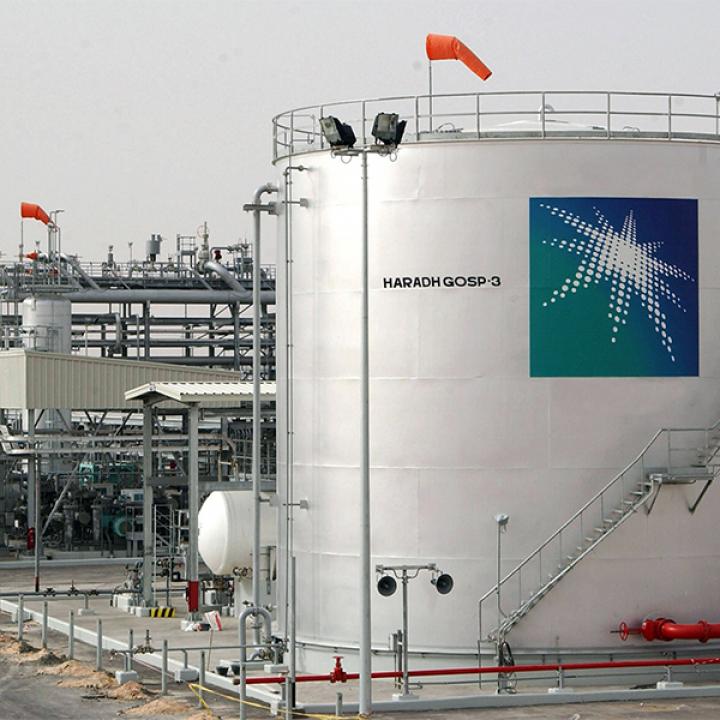

A further delay in the Saudi Aramco sell-off adds to a growing picture of policy unpredictability.
On August 22, reports emerged that Riyadh had canceled plans to sell shares of its state-owned oil company, prompting a swift but ambiguous denial by Energy Minister Khalid al-Falih, the company’s chairman: “The government remains committed to the IPO of Saudi Aramco at a time of its own choosing when conditions are optimum.” The Financial Times interpreted this to mean the sell-off had been “postponed indefinitely,” noting that the kingdom was instead seeking to borrow $12 billion from a group of sixteen international banks to finance the ambitious economic reforms floated by Crown Prince Muhammad bin Salman (widely known as MbS).
Although the recent recovery in oil prices has eased Riyadh’s financial concerns somewhat, it is difficult to see the delayed IPO as anything but an embarrassment to MbS, who has become the de facto ruler on most Saudi policy issues. Originally projected to happen this year, the Aramco offering was the key element in his Vision 2030 program for steering the Saudi economy away from dependence on oil revenues. The goal was to raise $100 billion by selling off 5 percent of the company. The prince’s determination to bring the kingdom into the twenty-first century has won him admiration internationally and among young Saudis, who now make up a majority of the population. Yet the adverse publicity adds to the widespread perception that he is relying on instincts that are difficult to predict, and perhaps even destabilizing across the decisionmaking spectrum.
FOREIGN POLICY
The crisis that erupted earlier this month between Saudi Arabia and Canada left policymakers across the world stunned at the kingdom’s overreaction. After Canadian foreign minister Chrystia Freeland issued a tweet criticizing the detention of two Saudi human rights activists, Riyadh recalled its ambassador from Ottawa, stopped all direct flights to the country, withdrew scholarships from several thousand Saudi youths studying there, directed Saudi citizens visiting Canada for medical care to leave, and barred any new trade deals. No sign of reconciliation has materialized thus far, and Prime Minister Justin Trudeau stated yesterday that “Canada will continue to stand up strongly for human rights.”
Meanwhile, the Saudi-led military campaign to reestablish Yemen’s internationally recognized government has been hampered by lack of progress on the battlefield and increasing international concern about civilian casualties. And last year, Arab and Western leaders watched in confusion as MbS detained and then forced the resignation of Lebanese prime minister Saad Hariri, who promptly un-resigned after returning home. MbS also seems unaware of the extent to which the ongoing squabble with Qatar is irritating Washington, which has been trying to unite Gulf allies in a coordinated effort to address one of Riyadh’s main vulnerabilities: Iranian regional interventionism.
On the economic front, international bankers remain enthusiastic about earning massive fees for organizing Saudi loans and sell-offs, but this eagerness may be blinding MbS to the fact that many foreign investors are reluctant to risk their money and intellectual copyright in a less than predictable jurisdiction. The unexpected rift with Canada might prompt further investor caution, as could the kingdom’s convoluted satellite television war with Qatar over pirated sports broadcasts and other disputes.
DOMESTIC POLICY
Giving women the right to drive is one of the prince’s signature accomplishments, but since issuing that decision last year, Riyadh has invited ridicule by arresting or silencing the women activists who spent years campaigning for it. News reports are now linking the issue to the possible execution of Israa al-Ghomgham, a woman from the Shia-majority Eastern Province who is facing trial in an anti-terrorism court on charges of incitement.
The prince’s personal extravagance has raised eyebrows as well. Although some might excuse spending nearly $1 billion on a luxury yacht and a French chateau as a ruler’s privilege, this proposition does not play well outside the kingdom and may even frustrate Saudi citizens, who have found their spending power reduced by the introduction of a value-added tax and higher utility prices.
At the same time, MbS has seemingly managed to keep a lid on elite challenges to his plans. Royal family resentment at the meteoric rise of the young crown prince, who turns thirty-three this month, has simmered down amid the prospect of further financial shakedowns or incarceration. Last year, several princes were detained at the Ritz-Carlton Hotel in Riyadh, spurring them and several other nervous royals to write checks that amounted to a $100 billion boost in government reserves. Similarly, the other leg of the Saudi power structure, the religious establishment (Ulama), underwent membership changes that have made it largely supportive of MbS. Yet the durability of this shift is uncertain, and some clerics are likely unhappy at decisions such as allowing live entertainment and easing the strict separation of men and women in public.
CONCLUSION
The number of Saudi policy controversies that have arisen over the past couple years is evidence of a need for some course correction. Although King Salman is in declining health, he apparently still acts as a counter to some of his son’s decisions and rhetoric, though not necessarily in the direction Washington would prefer—for example, shortly after MbS spoke favorably of shared Saudi-Israeli interests in an April interview with the Atlantic, the king publicly criticized President Trump’s recognition of Jerusalem as Israel’s capital. As a longstanding ally of the kingdom, the United States has many ways of offering quiet advice to forestall such controversies, but as of now there is little evidence that Washington is trying to temper the crown prince’s impetuousness.
Simon Henderson is the Baker Fellow and director of the Bernstein Program on Gulf and Energy Policy at The Washington Institute.



